You may be the best coder you know, but if you want to work on a team, you need to know how to collaborate with people with diverse perspectives and backgrounds. This is especially true in the world of open source where virtually anyone around the globe can review your code. How well you communicate, accept feedback, and handle conflict plays an important role in determining your success.
These are called soft skills, and they’re equally as important as technical skills—if not more, says Arun Gupta, VP and GM of the Open Ecosystem at Intel. In fact, of the 10 skills Forbes predicts will be most in demand in the next decade, eight of them are soft skills. Soft skills define an organization’s culture, and without a strong culture, no strategy will succeed.
In a recent keynote address at DevNexus*, Gupta covered five soft skills that can make you an indispensable part of any team and shared tips for cultivating them.
Skill No. 1: Communication
“Almost everything in our lives succeeds or fails because of communication or lack thereof,” says Gupta. That makes communication one of the most important skills in the workplace.
Though we often don’t think of it this way, two-thirds of a conversation is private. Only the communicator knows the intent of their words. On the other side of the equation, the listener is privately experiencing the impact of the speaker’s words. Only our words, actions, and nonverbal cues are shared. Mindful talking is a technique Gupta coined to help communicators ensure the impact on the listener aligns with the intent. As you share an idea, take time to ask the listener what impact your words have on them. If what your listener is hearing doesn’t align with your intent, choose different words to get your message across.
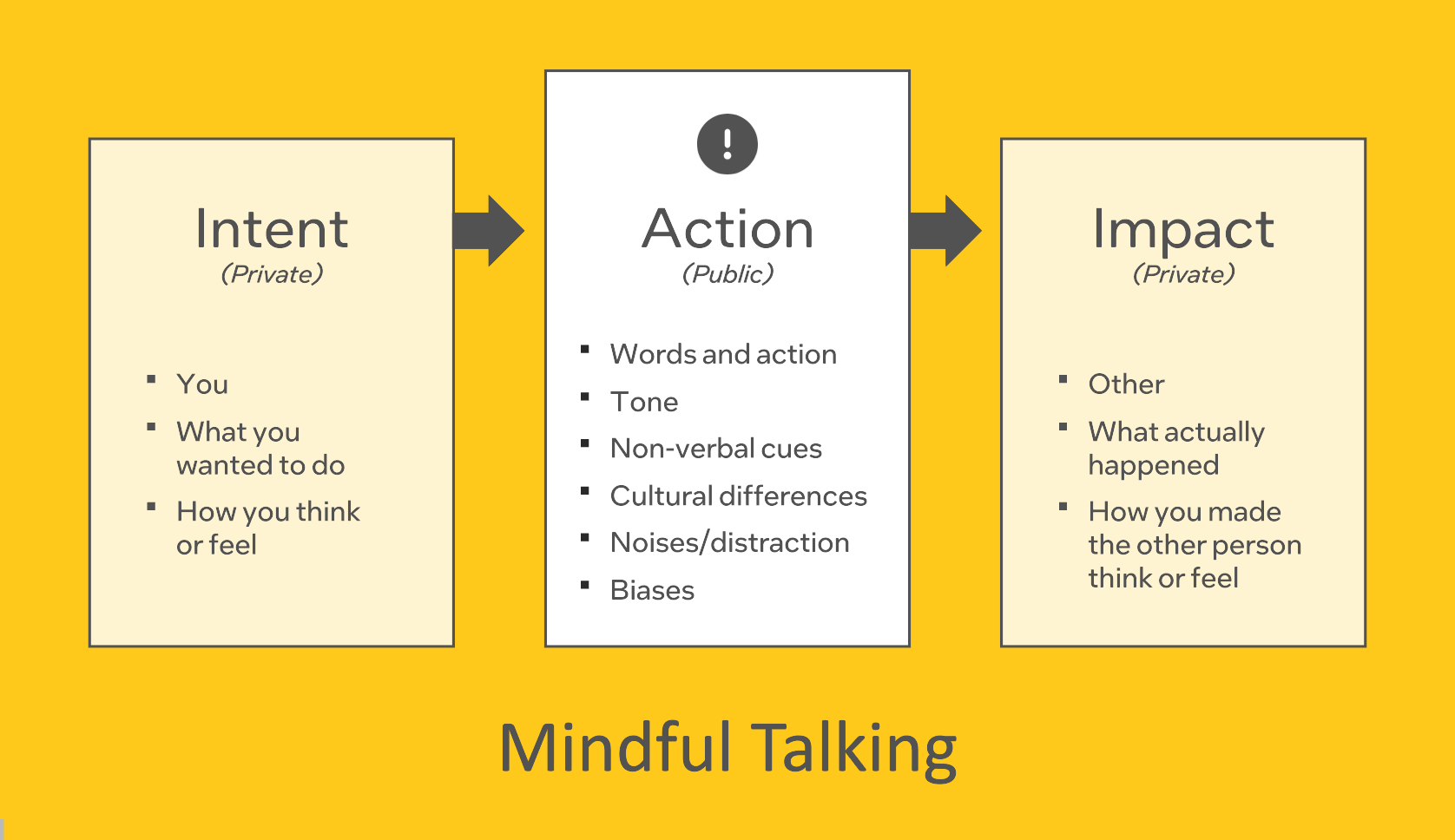
Mindful talking can help ensure the communicator’s intent is aligned with impact on the listener.
The biggest problem in communication, however, happens on the listener’s side. Quoting author Stephen Covey, Gupta says, “Most people don’t listen with an intent to understand, but with an intent to reply.” That’s where the art of reflective listening comes in.
Gupta says listening is not a time for passing judgment or forming an opinion. Instead, a listener’s goal is to simply soak up what the speaker says. Only after you understand the speaker’s point of view do you have the right to share yours. As the listener, paraphrasing what someone is saying can help ensure you understand—and in turn encourages the speaker to be more receptive to your point of view when you share feedback.

Paraphrasing the ideas of the speaker can help listeners listen to understand.
Skill No. 2: Adaptability
We’ve all heard about Darwin’s survival of the fittest theory. But what does “fittest” mean? The strongest? The tallest? No. “It’s really the survival of the most adaptable,” Gupta says. “As they say, change is the only constant.”
Whether you get moved to a new team or are tasked with learning a new tool, you’ll eventually experience change at work. Your success depends largely on how well you adapt to new circumstances. So how do you improve your adaptability?
First, Gupta recommends embracing failure. “I’m honestly a product of all my failures. This is what defines me. I have failed miserably so many times, but I just kept going.” Failure is inevitable; what matters is having the grit to learn from failure and try again.
You should also actively look for opportunities to unlearn and relearn. When you’re facing a change, practice letting go of the old way and use your resourcefulness and problem-solving skills to learn new ways to accomplish your objective.
Gupta has personally benefited from adaptability. About 10 years ago, Gupta and his son Aditya published a book called Minecraft Modding with Forge, designed to help kids with no programming experience learn the basics of coding while playing Minecraft*. However, many people don’t know that the original title was Minecraft Modding with Bucket. Just three weeks before publication, the Digital Millennium Copyright Act halted the project because of a conflict with Bucket. Instead of giving up, Gupta and his son rewrote the book—including the storytelling and code examples—to focus on Forge instead. They were able to publish the book just weeks later.
Skill No. 3: Conflict Resolution
Did you know the average person faces about eight conflicts per hour? While we often think of conflict as negative, conflict can be a valuable tool that helps propel projects and teams forward. It’s all about how you handle it.
The first step in healthy conflict resolution is determining what kind of conflict you’re dealing with: Is it a task conflict or a personality conflict? Task conflict revolves around challenges in what the task is or how it should be completed. Personality conflict is about who is completing a task. Sometimes the only way to solve a personality conflict is to talk through your differences directly. Gupta says meeting with someone over coffee or taking a walk goes a long way when bringing people together.
The goal is to minimize personality conflicts so a team can focus its energy on tackling task conflicts. If we were to think about this in terms of Tuckman’s stages of group development model, personality conflicts are a normal part of the forming and storming stages, when teams are being assembled and starting to build trust. As teams enter the norming and performing phases, personality conflicts should become less and less frequent.
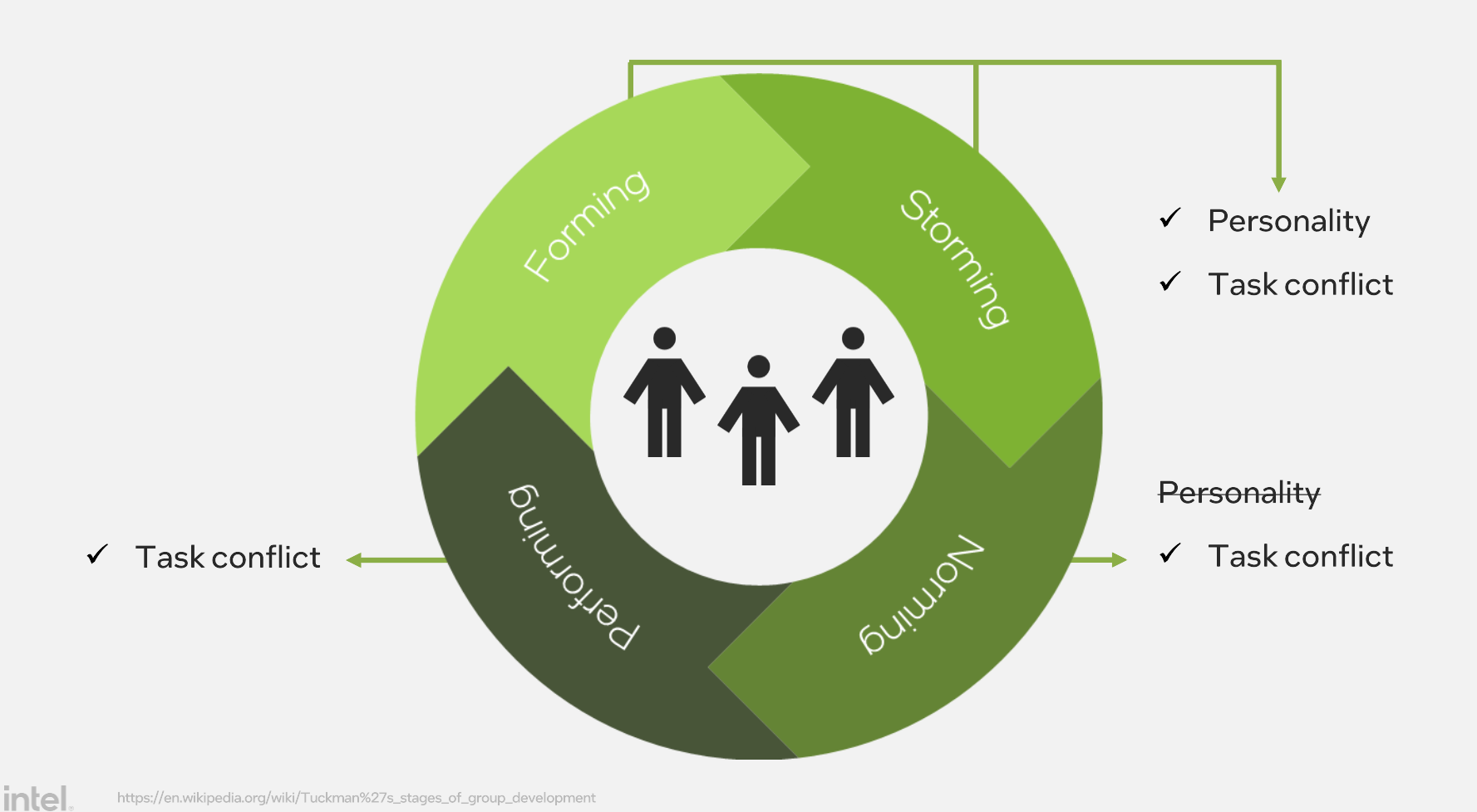
High-performing teams experience minimal personality conflicts.
Many times, personal conflict comes down to your tone. Actor Amitabh Bachchan said that 10 percent of a conflict is due to a difference of opinion and 90 percent is due to your delivery and tone of voice. For example, when you encounter a development bug, you can blame the issue on a teammate, or you can avoid pointing fingers and instead focus the team’s energy on how to resolve the bug. Be mindful of how you present information, and you’ll find yourself in fewer personal conflicts.
When you do find yourself in a conflict, either personal or task related, be aware of your biases. We often become so mired in the details of a problem that we forget what outcome we’re striving to achieve. Sometimes a simple attitude adjustment can help you check your biases and focus on arriving at the best solution for the team.
Skill No. 4: Kindness and Gratitude
Another important skill is one Gupta thinks the technology industry doesn’t talk about enough: kindness and gratitude. According to Gupta, the two are related and can spark a virtuous cycle.
When you extend kindness to someone without expecting anything in return, such as congratulating a teammate on a job well done or helping a new hire learn the ropes, it helps them feel good. In fact, kindness can even produce health benefits—for both the recipient and the giver—by helping to increase serotonin and oxytocin levels. Best of all, kindness often creates a ripple effect. Inspired by your kindness, a colleague or even an onlooker may experience gratitude for your thoughtfulness and choose to pass the kindness onto someone else. Everyone leaves the interaction better off.
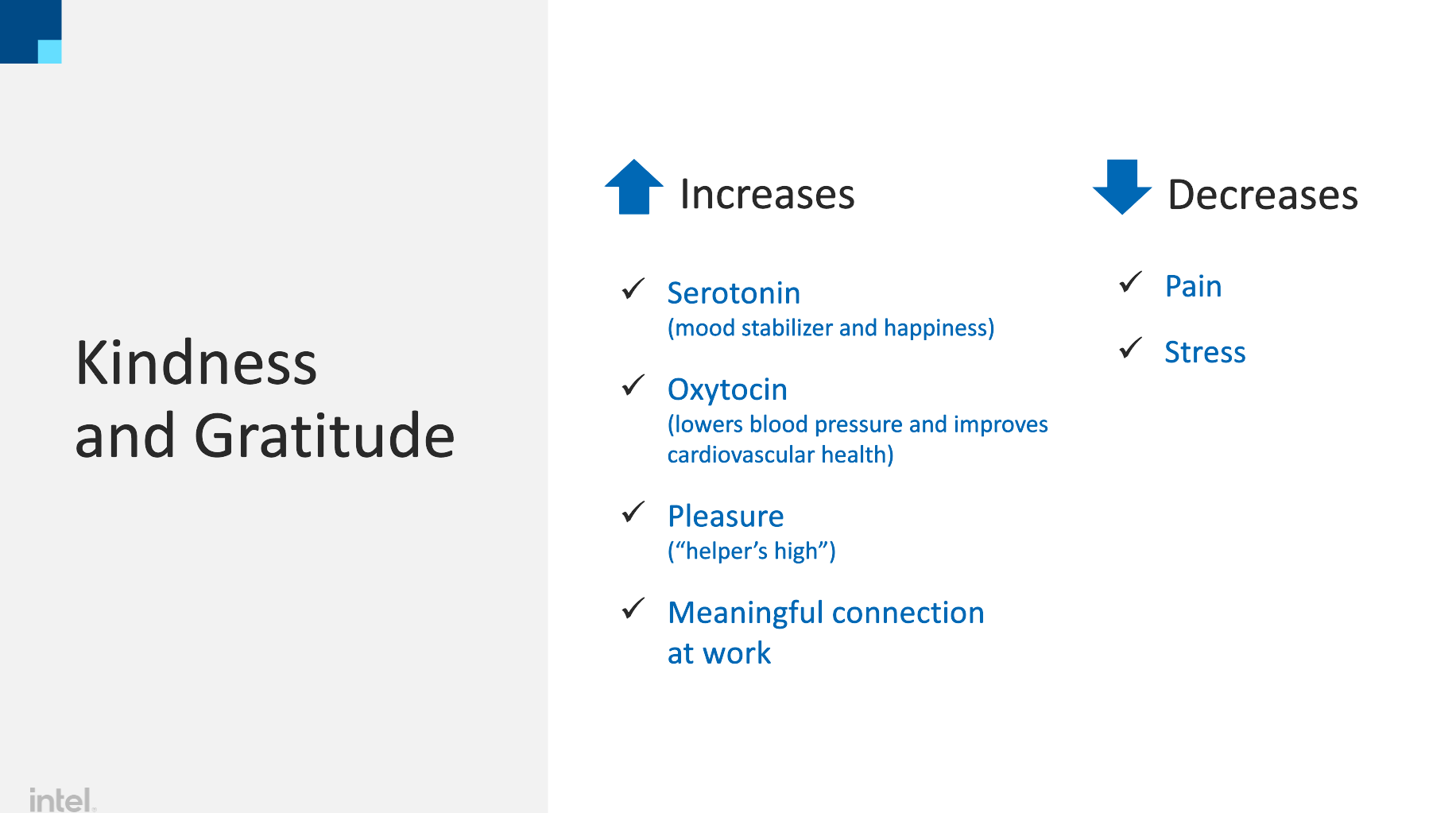
Kindness and gratitude produces health benefits in the form of happy hormones.
Gupta says kindness is a critical factor in creating a healthy workplace. A recent Gallup study found that across four generations of employees, employees’ mental and physical well-being is one of the most important things people look for in a job. By helping to foster meaningful connections, kindness can create a culture where employees can thrive.
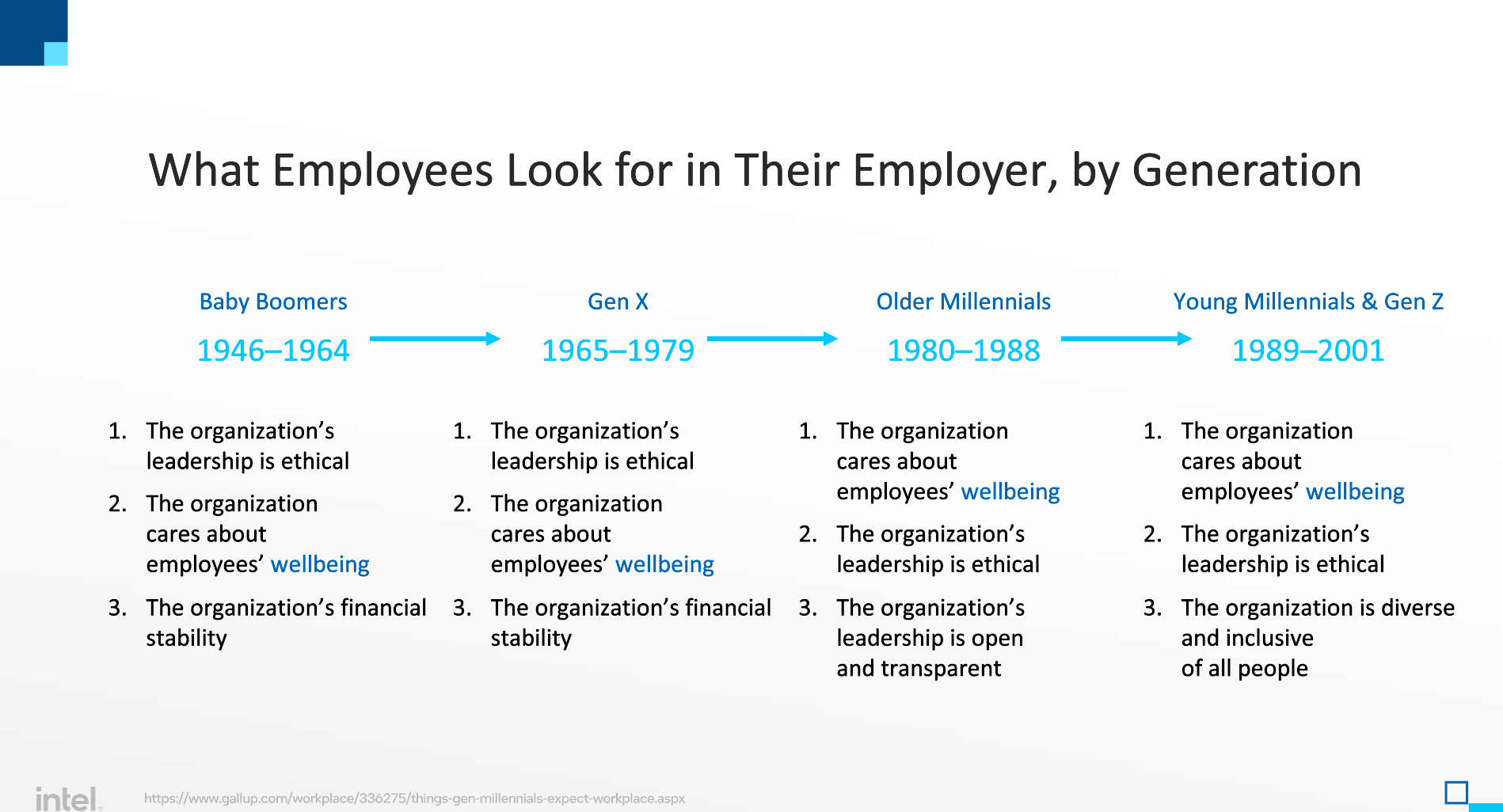
Well-being is one of the top traits employees of every generation look for in a company.
So how can you promote kindness in the workplace?
For one, Gupta usually starts team meetings with gratitude check-ins. Instead of waiting for big milestones to practice gratitude and celebrate wins, the team takes time each week to reflect on what individual team members are grateful for from the previous week. This helps make gratitude a more prominent part of each week and creates more opportunities for team members to express gratitude for each other’s efforts.
Similarly, Intel also has a spot recognition program. At any time, Intel associates can send a virtual kudos to acknowledge a colleague’s good work.
Skill No. 5: Mindfulness
Mindfulness, Gupta says, means being present in the current moment without judgment. Ajahn Sumedho popularized a mantra that goes: “Right now, it’s like this.” These five words help Gupta embrace each moment on its own terms. When he faces a challenge, being mindful helps Gupta ground himself, stop worrying about the past or the future, and focus on what he can do right now to make progress.
You can practice mindfulness while doing anything, from exercising to coding. All you have to do is focus on the present moment. For instance, when you’re in a meeting, instead of checking your email, be an active listener and look for ways to add value to the meeting. Instead of rushing through a meal or absentmindedly watching TV, mindful eating can help you savor your food.
While mindfulness can provide many benefits such as healthier, more engaged relationships and improved memory, it doesn’t magically fix everything. This is why the “without judgment” part of mindfulness is key. “The thing about mindfulness is it does not make the world around you perfect; it rather allows you to live in an imperfect world—and in a much more contented way,” Gupta says. Mindfulness gives you the tools to accept the things you cannot change.
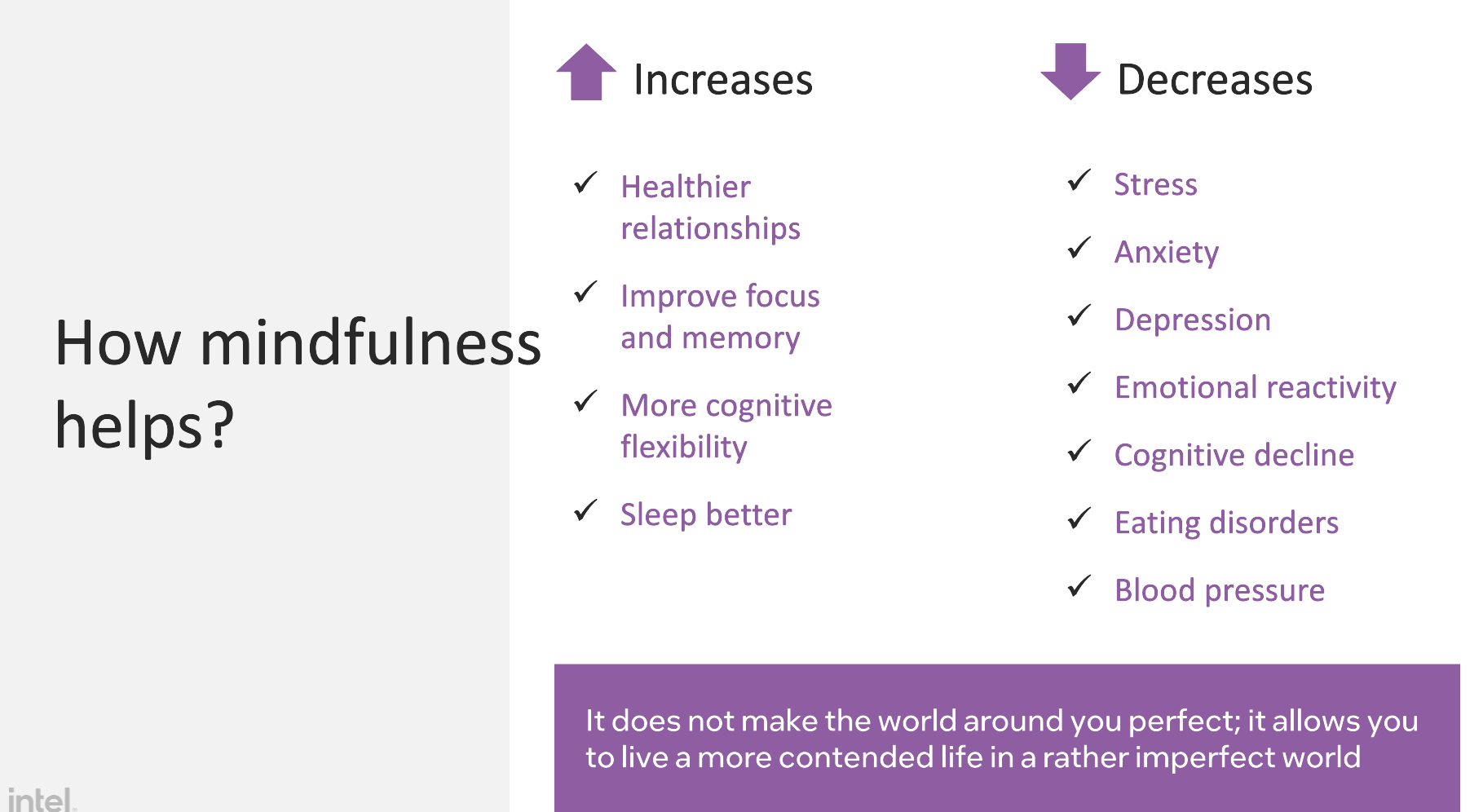
Like kindness, mindfulness can lead to many health benefits.
Gupta recommends several techniques for being more mindful. A body scan can help you mentally check in with yourself. Lie down on a mat and ask yourself how each part of your body is feeling, starting from your head and working your way to your toes. What sort of sensations are you feeling? Do you feel relaxed, in pain, or anxious? You can do this in 45 minutes or as little as five minutes.
To help focus on your breath, try breathing according to a 16-second cycle: inhale deeply for four seconds, hold your breath for four seconds, exhale deeply for four seconds, hold for four seconds, and repeat. Next time you feel anxious, this exercise can help you feel calm by turning your attention to your breath and increasing your oxygen intake.
Put Your Soft Skills into Practice
While it may sound easy, acquiring and practicing soft skills is anything but. Building soft skills requires a significant investment of time and energy. But if you invest in your soft skills as much as you do in your technical skills, you’ll become an indispensable employee and experience health benefits along the way.
About the Presenter
Arun Gupta, VP and GM of the Open Ecosystem, Intel
Arun Gupta is vice president and general manager of Open Ecosystem Initiatives at Intel Corporation. He has been an open source strategist, advocate, and practitioner for nearly two decades. He has taken companies such as Apple, Amazon, and Sun Microsystems through systemic changes to embrace open source principles and contribute and collaborate effectively.
